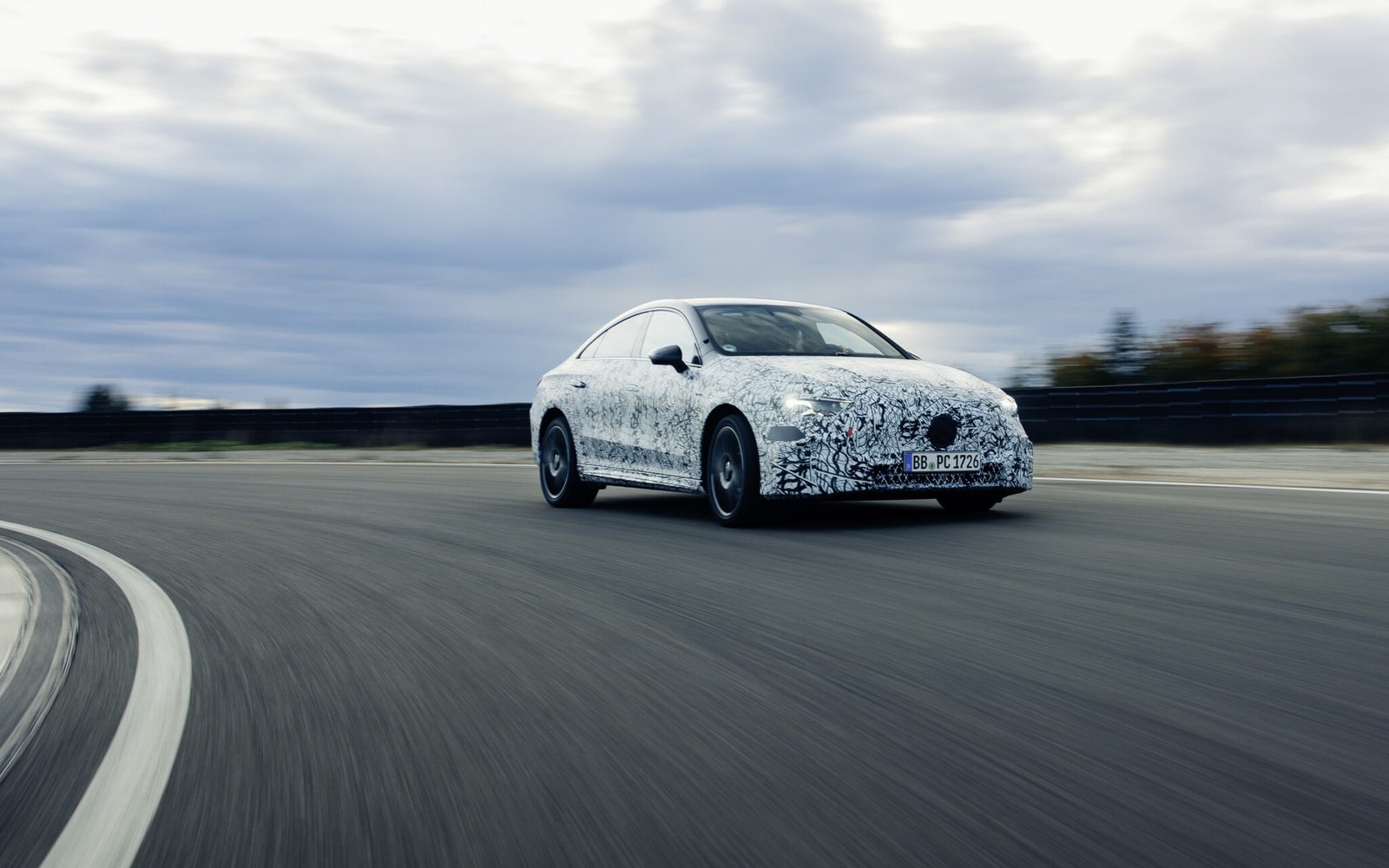Mercedes-Benz is currently finalizing the next generation of its stylish CLA sedan, which is set to be officially introduced next year. The new model will showcase the latest advancements in Mercedes' powertrain technology and software. Ahead of the formal reveal, the company shared images of a camouflaged CLA being tested on their track in southern Germany, driven by CEO Ola Källenius.
The upcoming CLA will be the first vehicle to utilize the new MB.OS, Mercedes' innovative operating system. This Linux-based system runs QNX in a hypervisor, ensuring that critical safety features like the dashboard display function securely. In 2023, CEO Källenius explained that while MB.UX will collaborate with third-party applications, Mercedes will maintain full control over the underlying technology.
In an exciting development, the CLA will feature Mercedes' first fully in-house electric vehicle (EV) powertrain. Previously, the company relied on partners like Bosch for the development of its EV powertrains. The CLA’s powertrain underwent extensive testing using the elegant EQXX concept vehicle, which is capable of nearly 750 miles on a single charge. In our testing of the EQXX in 2022, we gained valuable insight into Mercedes' EV engineering approach.
While the EQXX achieved an impressive efficiency of 7.44 miles per kWh (8.35 kWh/100 km), the same powertrain in a less aerodynamic EQB model returned only 5 miles per kWh (12.5 kWh/100 km), demonstrating an 80% improvement over the production EQB.
To showcase its capabilities, Mercedes took a CLA prototype to the Nardo test track in southern Italy, where it covered an impressive 2,309 miles (3,716 km) in 24 hours. This achievement broke the previous record set by Porsche in 2019 by 181 miles (291 km). During the test, the vehicle averaged 95 mph (153 km/h) while making 40 recharging stops, totaling 6 hours and 40 minutes of stationary time.
In a surprising twist, the sneak peek also revealed a new gasoline version of the CLA is on the way. As mentioned in February, Mercedes has reassessed its timeline and now believes that the transition to an all-electric lineup by 2030 may not be feasible, even in Europe. Consequently, the company aims to offer more "electrified" models alongside its EVs.
The gasoline variant of the CLA will feature a 48V mild hybrid powertrain, with the internal combustion engine sourced from Horse Powertrain Limited, a Chinese joint venture between Geely and Renault.
The upcoming CLA will be the first vehicle to utilize the new MB.OS, Mercedes' innovative operating system. This Linux-based system runs QNX in a hypervisor, ensuring that critical safety features like the dashboard display function securely. In 2023, CEO Källenius explained that while MB.UX will collaborate with third-party applications, Mercedes will maintain full control over the underlying technology.
In an exciting development, the CLA will feature Mercedes' first fully in-house electric vehicle (EV) powertrain. Previously, the company relied on partners like Bosch for the development of its EV powertrains. The CLA’s powertrain underwent extensive testing using the elegant EQXX concept vehicle, which is capable of nearly 750 miles on a single charge. In our testing of the EQXX in 2022, we gained valuable insight into Mercedes' EV engineering approach.
While the EQXX achieved an impressive efficiency of 7.44 miles per kWh (8.35 kWh/100 km), the same powertrain in a less aerodynamic EQB model returned only 5 miles per kWh (12.5 kWh/100 km), demonstrating an 80% improvement over the production EQB.
To showcase its capabilities, Mercedes took a CLA prototype to the Nardo test track in southern Italy, where it covered an impressive 2,309 miles (3,716 km) in 24 hours. This achievement broke the previous record set by Porsche in 2019 by 181 miles (291 km). During the test, the vehicle averaged 95 mph (153 km/h) while making 40 recharging stops, totaling 6 hours and 40 minutes of stationary time.
In a surprising twist, the sneak peek also revealed a new gasoline version of the CLA is on the way. As mentioned in February, Mercedes has reassessed its timeline and now believes that the transition to an all-electric lineup by 2030 may not be feasible, even in Europe. Consequently, the company aims to offer more "electrified" models alongside its EVs.
The gasoline variant of the CLA will feature a 48V mild hybrid powertrain, with the internal combustion engine sourced from Horse Powertrain Limited, a Chinese joint venture between Geely and Renault.
Mercedes-Benz is currently finalizing the next generation of its stylish CLA sedan, which is set to be officially introduced next year. The new model will showcase the latest advancements in Mercedes' powertrain technology and software. Ahead of the formal reveal, the company shared images of a camouflaged CLA being tested on their track in southern Germany, driven by CEO Ola Källenius.
The upcoming CLA will be the first vehicle to utilize the new MB.OS, Mercedes' innovative operating system. This Linux-based system runs QNX in a hypervisor, ensuring that critical safety features like the dashboard display function securely. In 2023, CEO Källenius explained that while MB.UX will collaborate with third-party applications, Mercedes will maintain full control over the underlying technology.
In an exciting development, the CLA will feature Mercedes' first fully in-house electric vehicle (EV) powertrain. Previously, the company relied on partners like Bosch for the development of its EV powertrains. The CLA’s powertrain underwent extensive testing using the elegant EQXX concept vehicle, which is capable of nearly 750 miles on a single charge. In our testing of the EQXX in 2022, we gained valuable insight into Mercedes' EV engineering approach.
While the EQXX achieved an impressive efficiency of 7.44 miles per kWh (8.35 kWh/100 km), the same powertrain in a less aerodynamic EQB model returned only 5 miles per kWh (12.5 kWh/100 km), demonstrating an 80% improvement over the production EQB.
To showcase its capabilities, Mercedes took a CLA prototype to the Nardo test track in southern Italy, where it covered an impressive 2,309 miles (3,716 km) in 24 hours. This achievement broke the previous record set by Porsche in 2019 by 181 miles (291 km). During the test, the vehicle averaged 95 mph (153 km/h) while making 40 recharging stops, totaling 6 hours and 40 minutes of stationary time.
In a surprising twist, the sneak peek also revealed a new gasoline version of the CLA is on the way. As mentioned in February, Mercedes has reassessed its timeline and now believes that the transition to an all-electric lineup by 2030 may not be feasible, even in Europe. Consequently, the company aims to offer more "electrified" models alongside its EVs.
The gasoline variant of the CLA will feature a 48V mild hybrid powertrain, with the internal combustion engine sourced from Horse Powertrain Limited, a Chinese joint venture between Geely and Renault.

·199 Views






